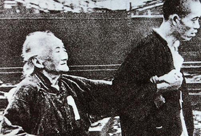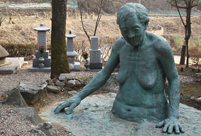 Martenitsa adds glamour to Bulgarian Embassy
Martenitsa adds glamour to Bulgarian Embassy
 Mysterious 'Dolan Tribe' in Xinjiang
Mysterious 'Dolan Tribe' in Xinjiang
 This is Shanghai
This is Shanghai
 Female attendants serving 'two sessions'
Female attendants serving 'two sessions'
 The many tears of DiCaprio
The many tears of DiCaprio
 Dan Dan's bittersweet opera life
Dan Dan's bittersweet opera life
 A dream wedding for a girl suffering from cancer
A dream wedding for a girl suffering from cancer
 Old photos of Anti-Japanese War (1937-1945)
Old photos of Anti-Japanese War (1937-1945)
 This is Beijing – Nanluoguxiang
This is Beijing – Nanluoguxiang
As China flexes its reform muscle, tricky problems stand in the way -- government streamlining, market-government ties, and insufficient legal guidance.
To clear these obstacles, authorities have turned to the rule of law.
The Standing Committee of the National People's Congress (NPC), the top legislature, intends to use the law this year to take reform to new heights.
After more than 30 years of reform, China is focused on deepening reform along the track of the rule of law, said Zhao Bingzhi, head of the Law School at Beijing Normal University.
"Stressing the rule of law reflects the Communist Party of China (CPC)'s new understanding and a dramatically changing legal environment," Zhao said.
In the 1980s many reforms were adopted without proper legal arrangements, but times have changed. A socialist system of laws with Chinese characteristics was established in 2010. China currently has 242 laws covering almost every aspect of political and social life. Most reform will require revision or abolition of existing laws, or completely new laws.
"No major reform should be conducted if it is not legally grounded," Zhao said.
The CPC grand reform blueprint first saw light of day in November last year. The plan includes more than 300 economic, political, social, cultural and environmental measures which all require legislation for implementation.
President Xi Jinping said last month during a meeting of China's leading group for overall reform that the "rule of law" must not just be followed, but highlighted through the whole reform process and that major reforms must have a legal basis.
Top legislator Zhang Dejiang said on Sunday at the ongoing parliamentary session that the legislature should combine legislative and reform decisions, allowing legislation to play its full role.
This year, the top legislature will revise the Budget Law to make the system more transparent, and the administrative procedures and review laws to protect the rights and interests of the public.
"Emphasizing the guiding and guaranteeing role of the rule of law in reform shows the CPC's commitment to the rule of law. It is an important part of the CPC's initiative to build a modern government," Zhao said.
There have been many recent examples of legal changes for reform.
November's package included abolishing the system of re-education through labor and allowing more couples to have second child.
Last year, the NPC Standing Committee revised 19 laws to change the role of the State Council, China's cabinet, by slashing administrative approvals.
According to Kan Ke, deputy director of the Commission for Legislative Affairs of the NPC Standing Committee, the November blueprint entails more than 70 bills.
"The reform must be in line with the law," he said, but with only seven years left to achieve the 2020 goals, bills must be dealt with in order of priority.
 Chaihe village, pure and peaceful fairyland in snow
Chaihe village, pure and peaceful fairyland in snow Belgians warmly welcome arrival of China's giant pandas
Belgians warmly welcome arrival of China's giant pandas Female marines receive tactical training in NW China
Female marines receive tactical training in NW China Blood memory: Nanjing Massacre in 1937
Blood memory: Nanjing Massacre in 1937 Top 10 pure beauties in showbiz
Top 10 pure beauties in showbiz British WWII veteran: I can't forgive Japan
British WWII veteran: I can't forgive Japan Tongban's dream of prosperity
Tongban's dream of prosperity Chinese frigate Yancheng holds drills in Mediterranean Sea
Chinese frigate Yancheng holds drills in Mediterranean Sea A visit to comfort woman's home in South Korea
A visit to comfort woman's home in South Korea Fairyland? Qingdao in sea of clouds
Fairyland? Qingdao in sea of clouds Top 10 most handsome faces in Asia in 2013
Top 10 most handsome faces in Asia in 2013 Female celebs with beautiful long legs
Female celebs with beautiful long legs Cat 'guardians' in Forbidden City
Cat 'guardians' in Forbidden City Large numbers of ancient coins excavated in Inner Mongolia
Large numbers of ancient coins excavated in Inner Mongolia Leisurely life beneath Zhonggulou, where time travels slower
Leisurely life beneath Zhonggulou, where time travels slowerDay|Week|Month